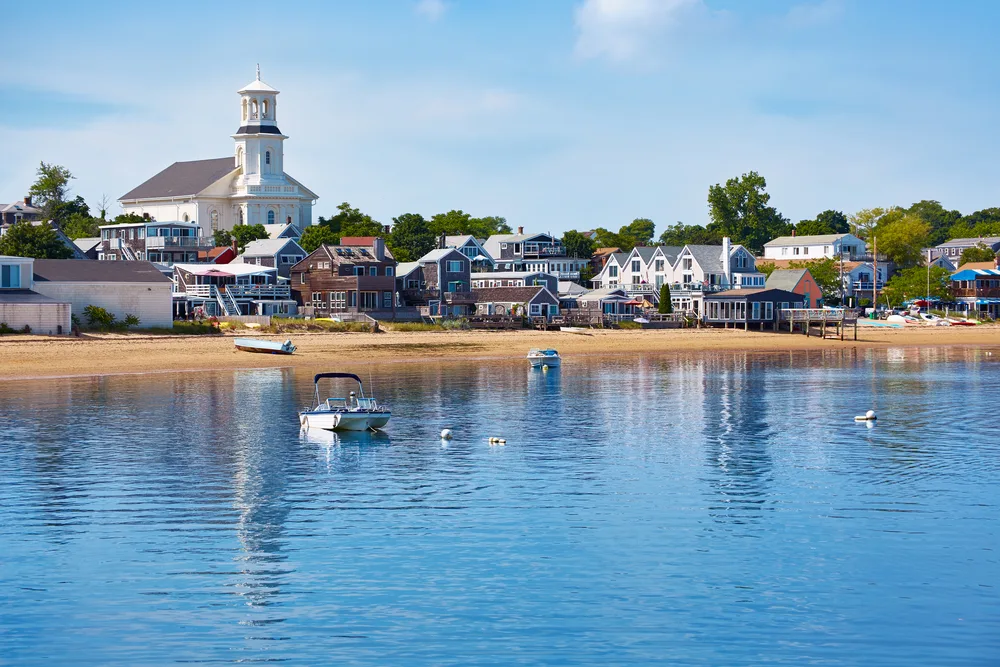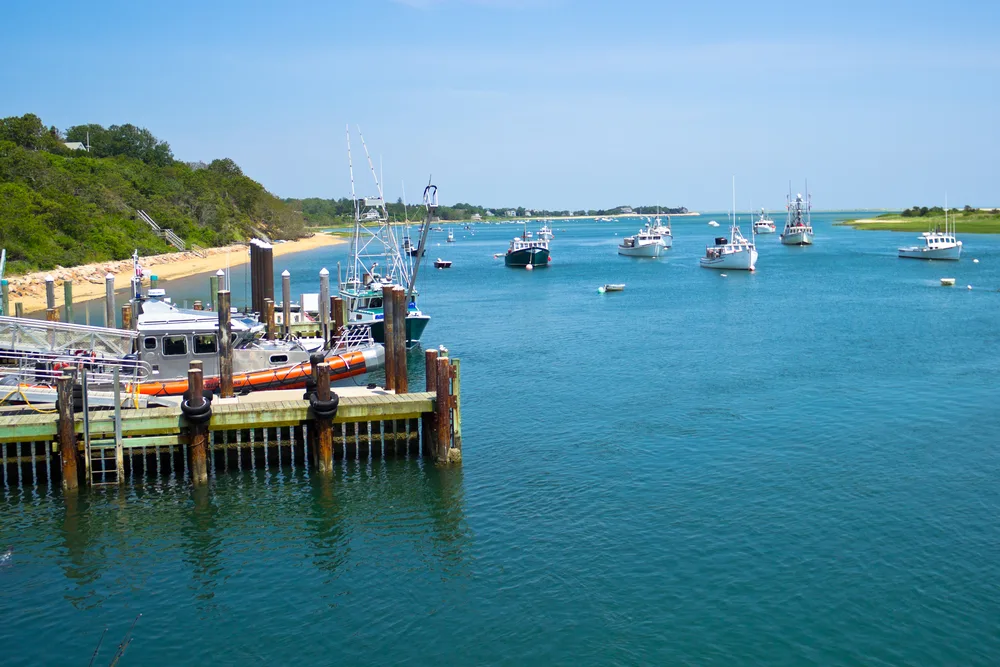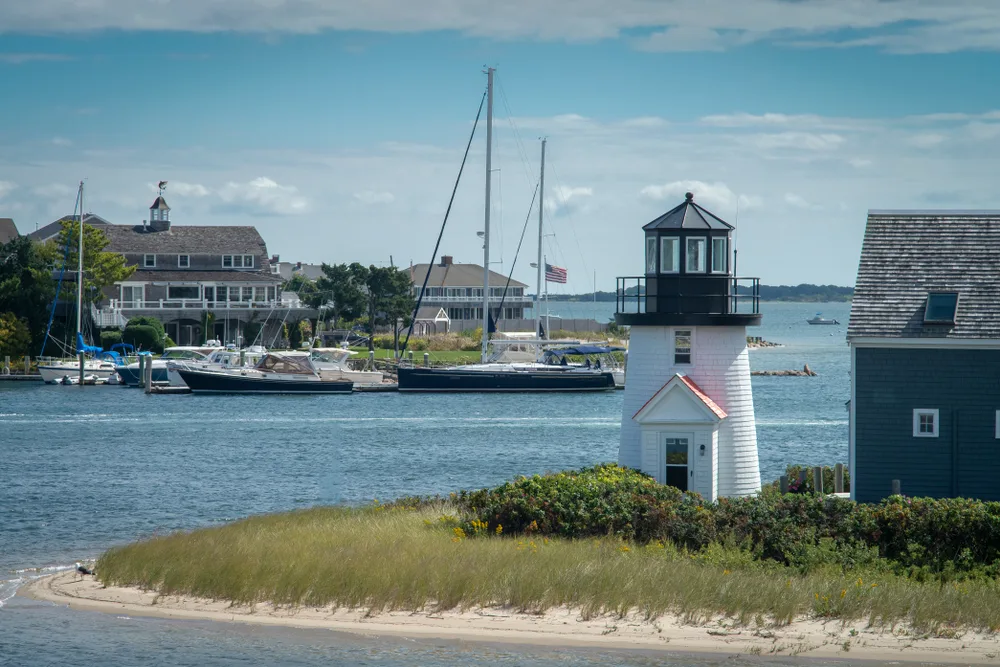Cape Cod is one of the most popular summer destinations in the United States. The beach community hosts about six million visitors each year. It’s also one of my personal favorite places to visit (I typically stay in Chatham).
Most visitors are drawn to the Cape Cod National Shore, a nearly 40-mile stretch of sandy beaches, wetlands landscapes, and historical objects such as lighthouses that make for a great day of exploration.
This storied area is also home to picturesque villages dating back to colonial times, such as the artsy Provincetown. The beautiful towns, perfect beaches, and relaxed atmosphere will quickly show you why people come back year after year.
But while it’s rich in history, marine life, and culture, is Cape Cod safe to visit? Here’s our take.
Is Cape Cod Safe to Visit in 2025?

Lunamarina/Shutterstock
Yes. Cape Cod is an extremely safe place to visit! The small, tight-knit community has few dangers and is welcoming to travelers.
During the summer high season, petty crimes such as vehicle break-ins may increase, but other dangers are not present. Visitors should just be careful when swimming as the ocean can be dangerous sometimes.
Cape Cod is a very safe destination; otherwise, it wouldn’t be so popular among tourists. In 2021, local officials said it was probably one of the safest vacation destinations in the United States.
Like any other popular vacation destination, Cape Cod has some crime. Common crimes that visitors may encounter include:
- Vehicle break-ins
- Petty theft
- Burglary
- Drug abuse
- Domestic violence
Violent incidents and severe crimes are rare on Cape Cod, and it’s even rarer that they affect visitors. This destination is truly a place where you can kick back and relax!
However, you shouldn’t relax too much in Cape Cod, especially not when you go swimming. It’s important that you take precautions at the beach, especially if you are not a strong swimmer or you are traveling with young children.
Ready to Book?
Unlock Exclusive Discounts on Expedia.com!
Got Travel Insurance?
Protect yourself for unexpected interruptions.
Compare Plans We may be compensated when you book after clicking on one of our links.The National Park Service has safety tips for people visiting the Cape Cod National Seashore. These tips include:
- Obey all posted flags, warnings, and verbal warnings from lifeguards.
- Never go to the beach by yourself. While public beaches are often busy, don’t assume that someone is watching you at all times.
- Avoid local wildlife — they may be cute, but they are still wild animals!
- Riptides sometimes happen in the waters along Cape Cod. If you get caught in a riptide, swim parallel to the shore until you leave the current, but don’t try to fight it.
- Protect yourself from the sun with sunscreen, hydration, and shade.
- Beware of sand as well. It collapses easily, so don’t try climbing sand dunes or digging deep holes.
Cape Cod’s beaches have lifeguards in the summer, but not during the off-season. When you can, try to stay on a beach with a lifeguard. One of the main reasons why people visit Cape Cod is the spectacular marine life located in its waters.
However, for swimmers, this marine life is less than pleasant. Great white shark sightings are common! There have been attacks before, including one deadly incident in 2018.
The local Chamber of Commerce published tips for visitors to swim safely and avoid sharks:
- Shark sightings are reported on the Sharktivity app and using flag signs at the beach. Don’t swim where there’s been a reported shark sighting.
- Don’t swim near seals or schools of fish as these are a shark’s prey and will attract a shark.
- Avoid deep or murky water where a shark is more likely to lurk.
- Don’t swim alone, especially not during dawn or dusk when sharks are more active.
- Sharks don’t want to attack humans, but they sometimes confuse humans for their prey. Avoid monochrome black wet suits as they make you look like prey. Avoid actions that attract sharks, such as splashing or wearing shiny items.
Crime in Cape Cod

Lynne Albright/Shutterstock
Crime exists in Cape Cod, but it’s not a huge problem for visitors or residents alike. Still, it’s a good idea to have some awareness as you move around the area.
According to FBI crime statistics for Barnstable, the name for the county Cape Cod is located in, the vast majority of crimes that occur are property crimes. The most common form of property crime is theft, which makes up about 58% of total crimes committed.
Violent crimes make up about 29.5% of total crimes committed in Cape Cod. Of these, the most common form of violent crime is aggravated assault, which makes up about 79% of violent crimes committed.
Visitors are extremely unlikely to be victims of assault or any form of violent crime. According to a local news report, the police numbers show that about 70% of assaults occur inside the home.
Most incidents of violence are connected to domestic violence incidents or other disputes where the two parties already know each other. These are tragedies, to be sure, but not problems that affect visitors.
Crime in Cape Cod has steadily declined over the past few years, thanks to increased resources by local authorities to fight crime. You will notice regular patrols as well as Community Service Officers in high-frequented areas such as Hyannis.
They are there to keep an eye on the situation and make sure that the community is safe. Crime is much higher during the summer season than during the tourist off-season. The population sometimes triples during peak weekends, and law enforcement resources in this small community are stretched.
The crowds provide extra cover for criminals to get away with what they are planning, and the rowdy behavior of the tourists themselves sometimes causes problems.
If you are visiting Cape Cod during the summer, just be prepared for a light increase in petty crime. Basic precautions will be enough to stop anything bad from happening, but you’d be surprised by how many people forget even the most basic precautions.
Petty Theft
Theft is the most common crime in Cape Cod. This broad category encompasses a few different types of crime, including petty theft such as pickpocketing, bag snatching, and scams. Petty theft increases in the summer, when there are more tourists and more opportunities for criminals.
Most thefts in Cape Cod are crimes of opportunity. Thieves notice that victims (usually tourists) are not paying attention to their valuables and take advantage of a moment of irresponsibility.
You can avoid being the victim of a crime as long as you don’t give thieves the opportunity. Since Cape Cod is a popular beach destination, many incidents of theft happen on the beach. Thieves go through people’s bags while they are swimming and take their things.
When you go swimming, try to leave most of your valuables locked in your hotel safe and take just the essentials. Place a towel over your bag. It seems silly, but just adding this extra step deters thieves because they want to go unnoticed.
The streets of villages such as Provincetown and Hyannis tend to get very crowded in the summer. These crowds create the perfect cover for pickpockets because it’s easy to bump against someone unnoticed.
Just making sure that your bags and valuables are secure is enough to deter Cape Cod’s thieves. Don’t put your bags somewhere where a thief can easily walk away with them, such as the back of a chair.
Put valuables in a place where it’s hard to reach for a thief, such as a zipped bag or your front pocket, when you’re walking through a crowd.
You don’t need to be constantly on your guard — Cape Cod is a vacation destination, after all. Some basic precautions and not letting yourself get too carried away are good enough to keep you safe.
Break-ins
Another common form of larceny-theft in Cape Cod is a burglary or break-in. Thieves often target visitors for this, so you should be careful in the summer.
If you are renting a vacation home or own a summer cabin, take precautions to keep it safe as thieves do sometimes hit vacation homes. It seems simple but lock your doors when you are away or sleeping, and close windows and balcony doors that provide easy access to the home.
Many people forget about this simple precaution and wind up regretting it. Vehicle break-ins are more common than home break-ins. There also have been cases of thieves stealing vehicle parts.
Thieves will sometimes target vehicles parked at beach parking lots or in other lots that they know are popular with tourists. Make sure that your car doors are locked and that your windows are rolled up enough that someone can’t easily break in.
You don’t want to make your car seem like a lucrative target. Put away anything, including loose change or phone chargers, as any small object in sight can be an attraction for thieves.
Never, ever leave your valuables in your car. Always take your phone, wallet, and ID with you, even if you’re just leaving the car for a few minutes.
Bigger valuables, such as purses and suitcases, should go somewhere where they are out of sight, such as a glove compartment or the trunk. Basic precautions are usually enough to deter burglars.
Avoiding Bad Areas

NayaDadara/Shutterstock
There are no parts of Cape Cod that are so dangerous that they are no-go zones. However, there are some areas where police report more crimes. In Hyannis, Main Street tends to see some drug-related activity.
Main Street is also the center for nightlife and bar-going crowds can get rowdy after dark. It’s not uncommon to see bar fights.
The Hyannis Transportation Center also sees an above-average rate of crime. Kalmus Beach at night doesn’t feel very safe because there is some drug-related activity, but the likelihood of a crime affecting you is still low.
Things to Consider

Chatham, Cape Cod, Massachusetts – March 5, 2023: Rainbow over Wild Goose Tavern in town center of Chatham on Main Street on a sunny day in winter/SunflowerMomma/Shutterstock
Here are a few additional tips for Cape Cod:
- Beware of traffic! In the summer, traffic on the bridges to Cape Cod and throughout the peninsula can be very heavy, especially on weekends. Time your travels differently or opt for public transportation and cycling.
- Smoking is banned in most places. You are not allowed to smoke in any place that is someone else’s workplace and smoking is banned on the beach.
- Don’t drink on the beach. Drinking impairs your judgement and you don’t want to be impaired while facing the ocean. Drinking and operating a boat is illegal.
Frequently Asked Questions

John Santoro/Shutterstock
Here are some other questions that people ask about Cape Cod:
Is it safe in Cape Cod?
Cape Cod is a very safe place to visit. The community is small and close-knit, meaning that there are few opportunities for crime.
What is the safest part of Cape Cod?
Cape Cod’s smaller towns and villages tend to be safer because they receive fewer visitors. Quiet hamlets such as Sandwich, Brewster, and Harwich are better for visitors concerned about safety.
Is it worth going to Cape Cod?
It is absolutely worth going to Cape Cod. It has one of the most beautiful stretches of shore in the northeastern United States and its New England charm is unmatched.
Can you walk around Cape Cod?
You can explore most of Cape Cod by foot. It is a very walkable area and most of the towns are located close to each other. For further exploration, you can rent a bicycle or bring your own.
Is Cape Cod too crowded?
Cape Cod’s crowds (and traffic) can definitely get intense in July and August, and on holiday weekends such as the Fourth of July. If you want to avoid the crowds, travel during the shoulder season.
So, Is Cape Cod Safe to Visit?
Cape Cod is very safe to visit, especially if you make sure to keep a basic eye on your belongings. There have been shark sightings in the area, so be sure to practice water safety when you go swimming. Happy travels!






